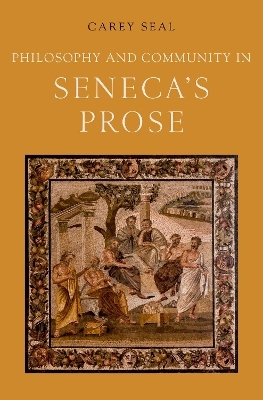
Philosophy and Community in Seneca's Prose
Seiten
2021
Oxford University Press Inc (Verlag)
978-0-19-049321-9 (ISBN)
Oxford University Press Inc (Verlag)
978-0-19-049321-9 (ISBN)
This book shows how the Roman philosopher Seneca balances the imperative to subject one's life to rational scrutiny with the claims of the Roman moral tradition.
The Roman philosopher Seneca addressed himself to the question of how we ought to live in letters and treatises that have engaged the attention of readers from his own day to the present. A committed, if critical and eccentric, adherent of Stoicism, he gives us a set of reflections on the good life that are rich both in philosophical subtlety and in vivid engagement with day-to-day life in ancient Rome. Philosophy and Community in Seneca's Prose proposes a new understanding of the relationship between these two facets of Seneca's achievement, examining how he balances the Socratic imperative to subject one's life to rational scrutiny, on the one hand, with the claims of Roman moral tradition on the other.
Carey Seal argues that we should think of Seneca neither as a spokesman for Stoicism who seizes opportunistically upon the data of Roman social life to make his case, nor as an expositor of the inherited values of the Roman elite in the language of Stoic philosophy. Rather, Seneca should be understood as someone intensely interested in the question of philosophy's social entanglements and presuppositions. Seneca's use of Roman politics and of the institution of slavery in elaborating his ideal of a life guided by reason is carefully examined in the book.
The Roman philosopher Seneca addressed himself to the question of how we ought to live in letters and treatises that have engaged the attention of readers from his own day to the present. A committed, if critical and eccentric, adherent of Stoicism, he gives us a set of reflections on the good life that are rich both in philosophical subtlety and in vivid engagement with day-to-day life in ancient Rome. Philosophy and Community in Seneca's Prose proposes a new understanding of the relationship between these two facets of Seneca's achievement, examining how he balances the Socratic imperative to subject one's life to rational scrutiny, on the one hand, with the claims of Roman moral tradition on the other.
Carey Seal argues that we should think of Seneca neither as a spokesman for Stoicism who seizes opportunistically upon the data of Roman social life to make his case, nor as an expositor of the inherited values of the Roman elite in the language of Stoic philosophy. Rather, Seneca should be understood as someone intensely interested in the question of philosophy's social entanglements and presuppositions. Seneca's use of Roman politics and of the institution of slavery in elaborating his ideal of a life guided by reason is carefully examined in the book.
Carey Seal is Associate Professor of Classics at the University of California, Davis.
Abbreviations
Note on Texts
I.Introduction
II. Solitude and Independence
III. Schools
IV. Slavery
V. Res Publica
VI. Conclusion
Bibliography
| Erscheinungsdatum | 29.04.2021 |
|---|---|
| Verlagsort | New York |
| Sprache | englisch |
| Maße | 236 x 163 mm |
| Gewicht | 544 g |
| Themenwelt | Geisteswissenschaften ► Geschichte ► Allgemeine Geschichte |
| Geisteswissenschaften ► Philosophie ► Ethik | |
| Geisteswissenschaften ► Philosophie ► Philosophie Altertum / Antike | |
| ISBN-10 | 0-19-049321-6 / 0190493216 |
| ISBN-13 | 978-0-19-049321-9 / 9780190493219 |
| Zustand | Neuware |
| Haben Sie eine Frage zum Produkt? |
Mehr entdecken
aus dem Bereich
aus dem Bereich
eine Familiengeschichte der Menschheit
Buch | Hardcover (2023)
Klett-Cotta (Verlag)
49,00 €
Eine wahre Geschichte von Schiffbruch, Mord und Meuterei
Buch | Hardcover (2024)
C.Bertelsmann (Verlag)
25,00 €


